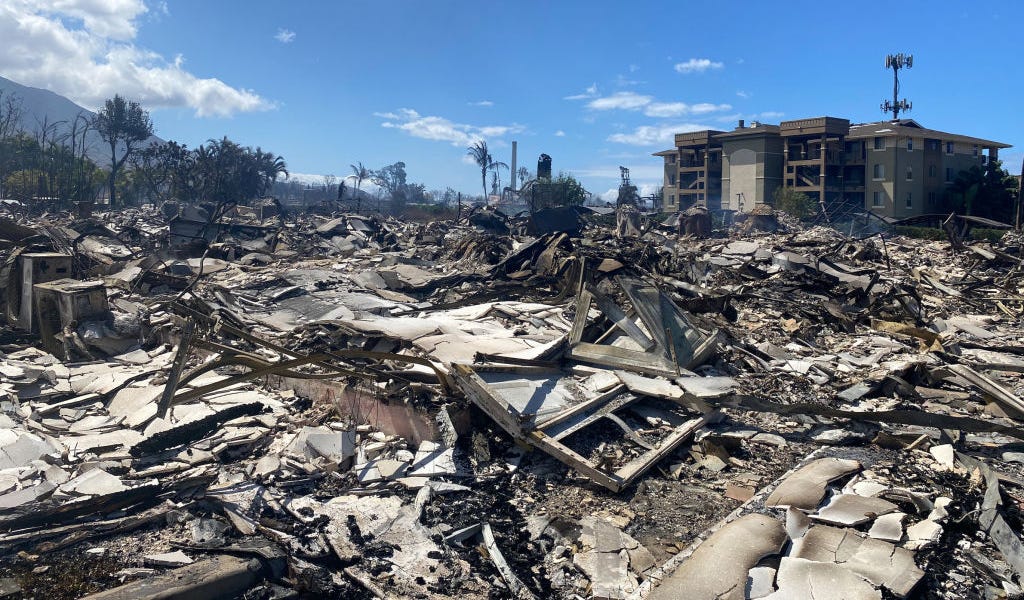hawaii & the urgency of land back
what's happening in Hawaii is happening all over the world, and has grave implications for us all. let's start with the context:
for years, native Hawaiians have asked that tourists top coming to Hawaii, and Maui especially. Here's what folks were saying in August of 2021:
Recent drought conditions have led officials to declare a water shortage in parts of the Maui County archipelago. Residents in those areas can be hit with a $500 fine if they use water for nonessential activities, such as washing a car or watering a lawn. While droughts have become more common in Hawaii in recent years because of climate change, the newly imposed water restrictions have led to pushback from some residents who say they are being asked to sacrifice resources while consumption from the hotel and tourism industry remains largely unchecked. “Stop coming to Hawai’i. They are treating us like second class citizens, literally cutting off our water to feed over-tourism,” former state lawmaker Kaniela Ing tweeted last month, sharing screenshots about the water usage prohibitions. The post got more than 144,000 likes and 53,000 retweets.
and still folks from all over the world have poured in, consuming resources that were already in short supply, drying out land that had been sustainably stewarded by the people indigenous to it for countless generations. if you've traveled to Hawaii, a link to mutual aid funds supporting folks on the ground is at the end of this newsletter.
we have to start changing our behaviors based on the ways tourism is fueling both climate change and the continued colonialism experienced by working class people all over the world.
american colonialism is still happening, and it is deadly
what is now talked about as a tourist destination and playground for the rich, was historically the capital of the Hawaiian kingdom, the seat of Hawaiian monarchy, surrounded by wetlands. it is still the site of Hawaiian cultural preservation. it is colonialism and settler greed that has gotten us into this mess.
“Lahaina was the heart of Hawaii before statehood, before we were a territory, before we were illegally annexed,” he said. “The people who live on Front Street and adjacent to it tend to be some of the most rooted, most valuable keepers of indigenous wisdom in the world.” “Lahaina wasn’t always a dry, fire-prone region. It was very wet and lush, historically. Boats would circle the famous Waiola Church. Lahaina was also the breeding place of aquaculture. It had some of the world's first and most innovative systems of fish ponds.” But at the dawn of the 18th century, sugar barons arrived and illicitly diverted the water to irrigate the lands they had stolen. (Note: 18th century European sugar and pineapple barons also brought invasive grasses, Wired reports, which now cover 26 percent of Hawaii and become “explosive” fuel for wildfires.) “Today, descendants from those same barons amass fast profits from controlling our irrigation, our land use, and political influence. Alexander and Baldwin are two big missionary families of the original oligarchs, and they’re currently the largest landowners on Maui. That’s the name of their corporation and they’re one of the top political donors here today. “So on one hand, the climate emergency caused this. On the other, it’s also that history of colonial greed that made Lahaina the dry place that it is.

what is happening in Hawaii will not end in Hawaii
drought conditions combined with a passing hurricane led to... a fire hurricane. jesus christ. this thing moved 60mph, a mile per minute, across land. there is no preparing for this or organizing an in-the-moment response. there is nothing but working our asses off to change the ways we engage with resources to try to begin to restore balance to our environments.
"I want to warn the entire planet about this," Hawaii Gov. Josh Green says. "When fire jumped from one spot to another, it got seeded very quickly with those 80mph winds... That's what a fire-hurricane is going to look in the era of global warming." pic.twitter.com/u754NmpEBF
— MSNBC (@MSNBC) August 13, 2023
like Hurricane Ida (bitch ass), which moved too fast for a state of emergency to be declared, this disaster shows us how climate change is fueling faster and faster weather events that don't allow us to escape them as we might have been able to in the past.
disaster capitalism is salt in the wound
as we saw in New Orleans after Katrina and Puerto Rico after Maria, Hawaiians are concerned about how the richest and most immoral of us will use this tragedy to hoard even more land.
Richy Palalay so closely identifies with his Maui hometown that he had a tattoo artist permanently ink “Lahaina Grown” on his forearms when he was 16. But a chronic housing shortage and an influx of second-home buyers and wealthy transplants have been displacing residents like Palalay who give Lahaina its spirit and identity. A fast-moving wildfire that incinerated much of the compact coastal settlement last week has multiplied concerns that any homes rebuilt there will be targeted at affluent outsiders seeking a tropical haven. That would turbo-charge what is already one of Hawaii’s gravest and biggest challenges: the exodus and displacement of Native Hawaiian and local-born residents who can no longer afford to live in their homeland.
all that can save us is land back
for thousands of years, people lived in relationship to Hawaiian and other ecosystems in ways that benefitted humans and all other species on the land. it is not that many generations ago that most of the American continent was stewarded by indigenous people who knew how to prevent forest fires, how to manage natural resources.
land back is not a lofty moral theoretical, it is a scientific, practical necessity. it is what can begin to restore the balance that is so clearly missing in our world.
“So as we rebuild—putting on the Green New Deal hat—it’s crucial that we uphold the Green New Deal’s vision of public lands, stewardship and water rights. It’s not just climate mitigation and adaptation. It’s also returning the control of our public trust resources into the hands of the public. “I know it can sound a little wonky or too aspirational. But I was walking through the main evacuation facility yesterday, talking to folks and helping move goods, and they were telling me that exact thing. They're like, “I just want to get back and start building houses, helping my neighbors.” They’re like, “What if we could just raise some money, buy back some of the land, and control it ourselves?” It’s intuitive.

share what you got
especially if you have benefitted from visiting native Hawaiians' ancestral lands, it's time to open those wallets.
this link will lead you to a fund being distributed among four different organizing groups recommened by Kaniela Ing, a seventh-generation indigenous Hawaiian, who is quoted extensively thoughout this newsletter.
https://secure.actblue.com/donate/mauilonghaul
as always, i hope this was useful.
with hope,
katie wills evans


